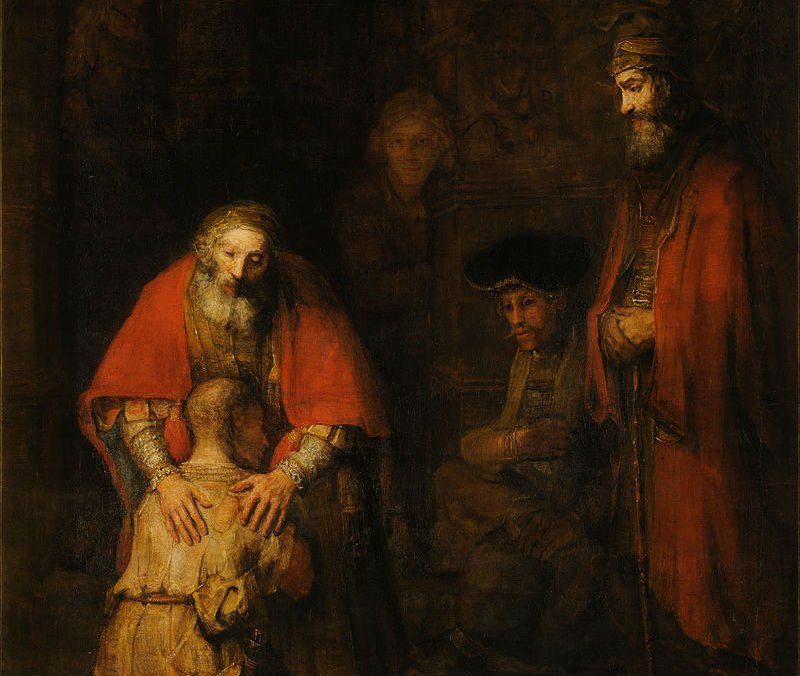
This post is part of the General Conference Odyssey.
Elder Marion G. Romney’s talk, Man—A Child of God, dove straight into some very Mormon teachings: “The truth I desire to emphasize today is that we mortals are in very deed the literal offspring of God.”
Members of The Church of Jesus Christ of Latter-day Saints accept this concept as a basic doctrine of their theology. The lives of those who have given it thought enough to realize its implications are controlled by it; it gives meaning and direction to all their thoughts and deeds. This is so because they know that it is the universal law of nature in the plant, animal, and human worlds for reproducing offspring to reach in final maturity the likeness of their parents.
They reason that the same law is in force with respect to the offspring of God. Their objective is, therefore, to someday be like their heavenly parents.
The emphasis on becoming like our Heavenly Parents is one of Mormonism’s most distinctive and controversial beliefs. Because it is so easy to misinterpret, we are often rather sensitive about it, and we take pains to point out that the belief has solid basis in scripture.
“The Spirit itself beareth witness with our spirit,” wrote Paul, “that we are the children of God.”[ref]Romans 8:16[/ref] Referring to Psalm 82, which states “ye are gods, and all of you are children of the most High,”[ref]Psalms 82:6[/ref] Jesus asked, “Is it not written in your law, I said, Ye are gods?”[ref]John 10:34[/ref]
We also often emphasize that early Christians held similar beliefs. I have a few quotes from an old PowerPoint presentation that my father put together years ago:
- “Let the interpretation of the Psalm [82] be just as you wish, yet thereby it is demonstrated that all men are deemed worthy of becoming gods.” – Justin Martyr
- “Yea, I say, the Word of God became a man so that you might learn from a man how to become a god.” – Clement of Alexandria
- “The Word was made flesh in order that we might be enabled to be made gods.” – Athansius
- “But he himself that justifies also deifies, for by justifying he makes sons of God. ―For he has given them power to become the sons of God‖ [John 1:12]. If then we have been made sons of God, we have also been made gods.” – Augustine
This is a good approach, but as I read Elder Romney’s talk, I had a different thought, which is this: How can we know our own theology if we don’t read these talks? What I mean by that is simply that I’ve seen fairly frequent debates about which beliefs are really doctrinal, which beliefs are core and essential, and frequently those debates refer to the Standard Works. And that is right and proper, but it is not enough.
If we believe in an open canon; if we believe in continuing revelation; if we believe that we are led by prophets, seers, and revelators (i.e. if we believe what we say we do), then the question of marking out the contours and landmarks of our faith is not an intellectual exercise for academics and scholars. It is a question of divine authority.
I’ll give you one specific example: there are those Mormons who take a very dim view of The Family: A Proclamation to the World. They will tell you that it is not canon (which, in fairness, is true), that it was written by lawyers, and so forth to argue that it’s not really Mormon. All well and good as intellectual debates go, but this is what I say in reply: go and start reading the General Conference talks and see how consistently, how prominently, how steadfastly the family is preached. You can’t go one session, it often seems, without at least a couple of paragraphs about the family as it relates to God’s plan for us. Any unbiased reader of the General Conference talks who was asked to list the most important topics would, without any ambiguity, list Jesus Christ and the Atonement first, and then families second. In that context, the critiques of The Family ring hollow.
As a Church that professes to be led by continuous, dynamic revelation it is impossible to understand our own faith without paying close attention to the ongoing stream of teachings. The Standard Works are the roots and foundation of our doctrine, but the branches and leaves are the General Conference talks.
And so, to return to Elder Romney’s talk, the idea “that man is a child of God is the most important knowledge available to mortals.” He concluded by bearing his own witness that “I know that I am a son of God, and that you, my beloved listeners, are individually a son or a daughter of God, and that this knowledge implemented in our lives will lift us back into his presence through the atoning sacrifice of our Savior, Jesus Christ.”
—
Check out the other posts from the General Conference Odyssey this week and join our Facebook group to follow along!
- Knowing that we are Children of God by Daniel Ortner
- One Simple Sentence by Jan Tolman
- Conception by Marilyn Nielson
2 thoughts on “We Are Children of God”
Comments are closed.